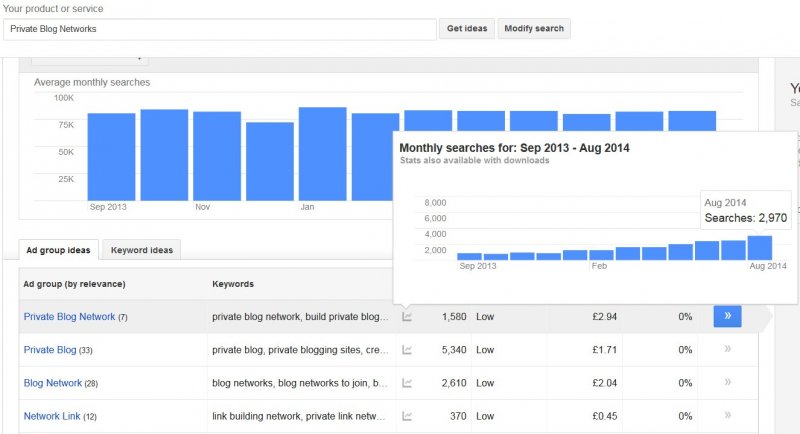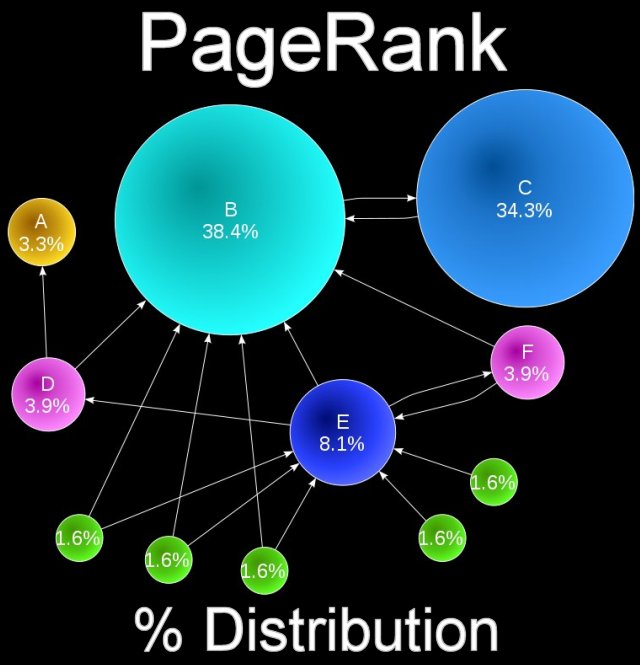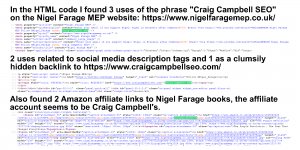Stumbled on a new marketing term this week (mid September 2014), Private Blog Networks (PBN’s).
I’ve been working on a network of websites for well over a decade to support my SEO business services (will soon be two decades), but never seen a website network/domain network called a Private Blog Network (PBN).
Looking through Google Analytics Keywords Tool for Private Blog Networks indicates it’s a new Internet marketing term, one of those silly marketing buzz words/phrase to sell old rope: another one is Web 2.0.
Did you know all Web 2.0 originally refers to (this is from 1999) is the move from using static HTML webpages to dynamically generated webpages, Web 2.0 is ancient. Today it’s been bastardised to include anything from social networking sites to video sharing sites: AKA the Web 2.0 term is marketing jargon that means nothing today, just a way for Internet marketers to sell us stuff.
When a marketing expert advises to use Web 2.0 Blogs to support your main money website, what they are actually saying is use dynamically generated Blogs to support your main website. That’s meaningless, today all major Blog platforms (WordPress, Blogger etc…) are dynamically generated.
Private Blog Network SEO Traffic
PBN looks like a trending marketing term in 2014.
Private Blog Network – 1,300 Monthly Traffic
Private Blog Network Service – 140 Monthly Traffic
Build Private Blog Network – 50 Monthly Traffic
Private Blog Network SEO – 40 Monthly Traffic
Building a Private Blog Network – 40 Monthly Traffic
Best Private Blog Network – 10 Monthly Traffic
Creating a Private Blog Network – NA Monthly Traffic
Assuming Internet marketers continue to promote these PBN terms to sell their products/services it’s likely to grow in popularity and be worth targeting for the relevant traffic.
Update April 2020: The traffic figures for Private Blog Network SERPs above are from September 2014, below are the same searches in April 2020.
Private Blog Network – 260 Monthly Traffic
Private Blog Network Service – 10 Monthly Traffic
Build Private Blog Network – 0 Monthly Traffic
Private Blog Network SEO – 90 Monthly Traffic
Building a Private Blog Network – 70 Monthly Traffic
Best Private Blog Network – 10 Monthly Traffic
Creating a Private Blog Network – 10 Monthly Traffic
Looks like the PBN Internet Marketing trend stopped growing, that’s the thing with fads, they tend to die out.
What’s a Private Blog Network
If you have built a network of websites to promote your important websites it’s what some are calling a private blog network. I’ve always referred to my network of sites (130 domains plus free supporting blogs) as my network of websites or network of domains not a PBN.
I don’t understand how it’s a Private Blog Network, how is it private and not all the websites are blogs?
Creating a Network of Websites or Building a Network of Domains doesn’t have the same buzz as saying I’ve Built the Best Private Blog Network etc… Maybe we could go one step further and use I’ve Created the Best Web 2.0 Private Blog Network SEO X-Plus :-)
This is what Internet marketers do to sell a product to the clueless newbies, rename something that’s mundane (it’s building not so important websites to promote your important money websites: it’s not rocket science) to make their products and services sound special and new.
Doesn’t mean there’s no value in a product/service, but always try to look past the car salesman trying to sell a secondhand car with the price tag of a brand new Ferrari.
Building a Private Blog Network
It’s really easy to build a network of websites to promote important websites, but even though it’s easy it can be expensive and time consuming. Really depends on how you build the network.
If you go with real domains (domains you own), you have to pay to register all the domains and pay for hosting, I own 130 domains and it’s not cheap registering and hosting them all.
To build a free PBN you can use free blogs like Blogger blogs, I even give away a Free AdSense/SEO Blogger Template. Since blogger is free to use your main cost is time, there’s not much point owning a network of say 100 BlogSpot blogs if you:
- A: Haven’t added unique content to each free blog.
- B: Generated backlinks to your free blogs.
It’s no use creating a free blog with copied content and using it to link to your important money websites and doing nothing to promote the free blogs. There’s no SEO value in links from websites that have no unique content and no backlinks.
Are Private Blog Networks Worthwhile?
You should be thinking to yourself: So let me get this right, to benefit from a private blog network I have to build loads of useful websites and build links to them all!
If you are having this thought, well done, you are absolutely correct.
PBNs are a LOT of effort to build just to add links to your money websites: remember most of us are doing this to make money online, not to create websites as a hobby. As I mentioned above I own a network of around 130 domains plus some free blogs, but I don’t (or no longer, since I used to) create websites just to link to other websites. I used to create websites just to link to my money websites, but realised if I’m going to have to go to the trouble of acquiring unique content and backlinks for them all I’m going to create more money sites not low quality sites just for promoting other websites.
Yes, most of my website network is built to make money directly and the SEO benefit of being able to link related parts of the network together is a bonus. Some of my older sites are so rubbish I’m slowly removing them from my network and concentrating on better quality websites like this one.
Private Blog Network Services
Whilst researching PBN’s I noticed a tendency for Private Blog Network Services to be selling products that revolved around buying expired and deleted domains for backlinks. Google does consider this attempting to game their search engine, it’s black hat SEO, so be careful.
This medium term is a waste of money. Many years ago (way over 5 years ago) Google changed it’s search engine algorithm to reset the backlinks and PageRank of expired/deleted/dropped domains. If a website expires today it will still show backlinks and PageRank (Update: Google no longer shares public PageRank data) for a short period of time, but this is temporary, Google resets the SEO value of domains that haven’t maintained registration between owners.
If you buy a domain that’s not expired the link benefit/rankings etc… is maintained by the domain, but if it’s expired, then medium term it’s all reset. I fell foul of this one when Google first started resetting the PR of expired domains: I’d bought a bunch of expired domains pretty much the month Google changed their algorithm, complete waste of money those domains were.
If you find an expired domain with a lot of click through traffic, that’s valuable, but if you are buying it for the backlinks/PR you are wasting good money long term.
PageRank Updates and Expired Domains
Note: consider as I write this (September 2014) Google hasn’t updated public PR this year. If you bought an expired domain 6 months ago and it says it’s still PR4, that doesn’t mean it’s actually PR4, PR hasn’t updated yet. If you’ve built no backlinks to the dropped domain it will likely drop to PR0 when Google updates PR. If you added links after buying an expired domain it will have whatever PR is deserves from your new links.
Update 2016: It’s years since Google updated public PR and Google no longer shows public PR. Google still uses PageRank (PR) in it’s search algorithm, but no longer provides a public PR number.
David Law

















This is one of my many SEO tests using comments to see how easy SERPs are etc…
In a discussion at the Warrior Forum warriorforum.com/search-engine-optimization/1004103-how-long-does-takes-first-page-google.html which is about how long it takes to get to page 1 in Google and a poster (Mike Friedman) wrote regarding using the exact match Google search:
So made the comment below (adjusted so not duplicated content):
How is it an SEO myth?
By adding speech marks to a search phrase it limits the webpages found to those only using the exact match phrase. Those webpages are more likely to be specifically targeting the phrase.
Search Google for : Private Soap Network
18,600,000 results, indicates it’s hard to a webmaster, from this you have no idea how hard a webpage is targeting the SERP.
Search Google for : “Private Soap Network”
No results found.
The phrase Private Soap Network (for obvious reasons) has not real competing pages (no one is targeting it). Right now there are zero webpages that use the exact phrase “Private Soap Network”.
There will be at least two soon.
This is ONE of many quick checks to see how much SEO competition there MIGHT be for a search phrase. It’s not the be all and end all of determining your competition, but for your average webmaster it’s a really quick way to see who you are up against.
Here’s a real example:
Private Network 2.0 : 29,100,000 results
“Private Network 2.0” : 51,700 results
The exact match are the webpages most likely to be specifically targeting this SERP, so real competition is probably under 50,000 webpages.
An easier one.
Private Network 2.0 Course : 2,820,000 results
“Private Network 2.0 Course” : 1 result, goes to Mike Friedman’s Private Network 2.0 Course (2017 update: deleted the URL as the domain seopubacademy.com is no longer active).
That’s a phrase that could be easily targeted.
I’ve given this comment a comment title Private Network 2.0 Course and when Google indexes the Stallion SEO Super Comment page (link bottom right of this comment) it will probably rank high for this SERP.
Any SERPs will be due to this comment and the single internal backlink to the Stallion SEO Super Comment, won’t be doing any other SEO promotion.
This is SEO 101, real basic SEO stuff.
Having this comment also aids the main article which is targeting Private Blog Network SERPs. This comment has two links which use the keywords “Private Network” and of course I’ve used relevant PBN SERPs in the comment text.
David
David,
You are still missing the point. The number of search results has nothing to do with the level of competition. I don’t care if you put it in quotes or not.
Your competition is the top 3 results. That is it. That is where the majority of search traffic goes.
Using your method for judging competition, you will find a lot of keywords that show a huge number of results, but have really weak sites at the top, and you’ll skip them and miss out on what could be profitable campaigns. You will also find the opposite to be true. There are search terms with few results, but really competitive webpages at the top.
Think of it like a runner in a race. If you are the 3rd fastest runner in a race, it doesn’t matter if there are 50 competitors in a race or 50,000 competitors in a race. You are still 3rd.
You are generally right about the top 3 being your main SEO competition, unless you have a top 10 HIGH traffic SERP the traffic is practically non-existent if you aren’t top 5 and it’s top 3 where the real traffic/money is. So no major arguments on that point.
Determining SERPs Competition
You are also right if you ONLY used the exact match keyword search check to determine likely SEO competition for a SERP.
That’s why I said “This is ONE of many quick SEO checks to see how much SEO competition there MIGHT be for a search phrase” not “this is the only SEO keyword competition analysis check you need to do to determine competitiveness”.
If doing a full competitiveness SEO analysis I also check multiple domains in the top 10 for a phrase (in no particular order):
PR Analysis: Indication of backlink strength – would be nice if Google updated PR :-)
Alexa Ranking: Weak indication of popularity of site, you have to take the niche into account on this one.
Google AdWords Monthly Traffic Numbers: If advertisers are willing to pay for a SERP, probably a competitive keyword.
Age of Domains: New domains in a SERP suggests relatively easy – takes a year to pass full link benefit from new links, if domains listed are under a year old strong indication of an easy keyword. Because they are new, they can’t have a lot of off-page SEO, the implication is they have the SERP due to on-page SEO factors and on-page SEO is easier to beat than off-page SEO.
Are the top results homepages or deep content: Generally harder to gain SERPs using deep content (fewer backlinks).
Are the title tags generally using the keyword phrase: If most title tags use the phrase suggests competitive.
Are brands like Amazon, Wikipedia etc… top 5 for multiple keyword SERPs with deep content pages: can indicate a niche without strong independent competition. Most brands on-site SEO is shit, if a SERP is dominated by brands with deep content indicates the rest of the competition is weak.
etc…
None of the above SEO keyword analysis techniques alone give a clear cut “this is an easy keyword” vs “this is a competitive keyword”, but together they indicate SEO keyword competitiveness. There’s an art to determining competitiveness, only way to get good at it is lots of SEO keyword competition analysis practice.
The SERP examples I used in the other comment are piss easy and I expected good results with just an optimized comment and no backlink work because there’s no true SEO competition.
Currently my Stallion SEO Super Comment page is number one in Google for Private Network 2.0 Course (and number 10 for Private Network 2.0) because it’s an easy SERP with only one real competing page (yours) and my page is better optimized on-page SEO wise even though it’s just a comment.
I’ve no interest in the SERP,
have added a dofollow link from the comment to your page (gives two backlinks, one from the main article and another from the indexed Stallion SEO Super Comment). So anyone finding their way to my comment looking for your PBN course will have an easy route to your course.David
The only problem is that if you are using the number of sites in the index as an initial filter, like I said, you could be screening out a lot of viable keywords that you will never do any further research on because you found more than XXXX number of results in Google.
I just did a quick check on one of my clients to get a baseline on this. We are targeting 30 keywords. Right now 20 are in the top 5. Of those 20, 7 have over 2 million results in the Google index when you search in quotes. Another 6 are over 500,000 results. Those 13 keywords are probably bringing him in about $6,000/month right now.
I wonder how many SEOs would have told him not to target those keywords because they were “too competitive”.
It’s a technique that is just not based on any kind of reality.
I blame the idiots behind Market Samurai for this technique still existing. They push it as one of their “Golden Rules” I believe. It’s just a scam to make their software appear useful.
Oh I see, you think I’m saying if a SERP is competitive don’t target it at all?
Absolutely not, this is checking likely competitiveness, will indicate if a SERP can be targeted mostly with on-page SEO or will need significant off-site SEO (backlinks) as well. You will have a better idea of SEO outcomes, how much effort a SERP will require so you can be realistic with expectations.
I’m sure you know each domain without new off-site SEO work will have a particular ability to rank for competitive SERPs based on their current off-site SEO (strength of their backlinks) and when working on a websites on-site SEO you have to be realistic.
We’d both like the SEO SERP and the Search Engine Optimization SERP, but realistically to gain competitive SERPs requires significant off-site work. If we both targeted our homepages at just SEO or Search Engine Optimization as the main keyword/phrase we’d both fail because neither of us have the off-site SEO at this time to rank for those highly competitive SERPs. If we don’t have tools to check SERP competition how are we to know what’s worth targeting with our current SEO abilities?
I’m targeting the WordPress SEO Package SERPs (I’d like SEO Package and WordPress SEO long term), you appear to be targeting SEO Training on your homepage.
We are both targeting competitive SERPs, but they are realistic than just just targeting SEO or Search Engine Optimization. With off-site work we can both gain them in a reasonable time frame.
I’m top 10 for my homepage SERPs, still need work to make top 3, I’ve been working on this site since February 2014 and know it won’t be easy-ish until it’s about a year old assuming I’ve worked on off-site SEO as well (no off-site SEO and will be never rank). I’m not top 20 for SEO Package search, maybe next year if the off-site goes well.
I assume you give your SEO clients similar advice, if you had a client selling pet food on a new domain you wouldn’t advise targeting the one word SERPs Pet or Food or even the two word phrase Pet Food from day one, way too competitive for a new domain. You would advise targeting long tail SERPs for instant traffic and over time target competitive SERPs to build search engine traffic long term. More off-site you do and older the domain gets (or to be more precise older the backlinks are since domain age per se is irrelevant) the harder the SERPs you can target.
SEO Tutorial is a SERP I’m targeting, currently just outside top 10, needs more off-site as it’s competitive.
I have a lot of top 20 competitive SEO SERPs (AKA not in the money SERPs :-)) due to strong on-site SEO, need the off-site AND time (backlinks to age) to push them into the top 5. Nothing I do on this domain will result in top 3 for SEO Tutorial, I must work on off-site. Doesn’t mean I can’t gain traffic today from easier SERPs though: I target thousands of SERPs.
BTW I’ve never used Market Samurai, so no idea what Market Samurai considers a golden rule. I’ve used these SEO techniques for well over a decade, they work, when I sold SEO services (worked as an SEO consultant for 10 years) I used these concepts to help SEO clients target the right SERPs and make millions of dollars in sales.
David
For those interested in learning how to choose SEO keywords etc… using keyword research tools etc… I wouldn’t suggest spending half your life on this sort of keyword competitiveness research.
I don’t perform this level of Search Engine Optimization research on every keyword I target, I use this when I’m having problems generating a SERP and I want to understand why I’m not ranking high.
Time is better spent on basic keyword research using free keyword tools like the AdWords research tool and building content that can rank in search engines. In the time spent SEO analyzing one SERP you could write an SEO’d article targeting the SERP!
It’s better to spend your time building a site targeting both competitive and long tail SERPs, this way you have the webpages targeting hard SERPs and over time you can build links to them and at the same time generate traffic now from easy SERPs (Rome wasn’t built in a day).
Easy way to choose keywords to target is decide on an article subject.
Go to the Google AdWords Keyword Research Tool (it’s free), find some relevant phrases related to the article you plan to write (or have written) and use those phrases within the articles content.
I planned to name this comment “Learning How to Choose SEO Keywords” before any keyword research, had no idea if it had any traffic. So will use the Google AdWords Tool to find at least one SERP with traffic I might be able to gain with a comment.
With Stallion Responsive comments can target long tail keyword SERPs which have low competition (no chance with competitive SERPs). I’m going to assume if I can find a phrase using the AdWords keyword research tool that’s 4+ words long and has some traffic (not a lot) it’s probably not got much competition (it’s a comment, not going to spend a lot of time checking: a lot of the time with comments I guess and do no keywords research).
Started with “SEO Keywords” which lead me to “SEO Keyword Research” with 720 searches a month.
This lead me to “SEO Keyword Research Tools” with 50 searches a month and further checking “Free Keyword Research Tools for SEO” with 70 searches a month, that will do.
New comment title: How to Use Free Keyword Research Tools for SEO
That will be used as the title tag, H1 heading and anchor text of links to the Stallion SEO Super Comment, basic on-page SEO sorted.
I then went back through this comment looking for places to add the above phrase or derivatives of the above phrase. On-page SEO done.
After that had another keyword check and found “How to Choose Keywords for SEO” with 110 searches a month which is close to the first title, so changed my mind and went with the comment title: Learn How to Choose Keywords for SEO
Better match for the comments content.
If this were a WordPress post I’d add at least one image with relevant alt text, add some links out to other pages on the site that’s relevant… It’s a comment targeting 100 visitors a month, doing this for a comment would be chasing pennies.
Edit: remembered after publishing the comment I had a page about the AdWords keyword tool so added a link to the webpage and an image from that article.
Update 2020: I changed the comment title to “How to Use Keywords for Search Engine Optimization” because according to keyword research around 50 people a month search Google for the longtail search How to Use Keywords for Search Engine Optimization and maybe I can gain that SERP with a WordPress comment. The original title 5+ years on was no longer a traffic generating search phrase.
David
No, that’s not really what I am saying at all. I’m saying that the number of results in the index gives you zero idea of how competitive a keyword really is or is not.
“lack of beer” shows almost 4 million results in quotes. However, it is not competitive at all. By the number of results in Google test though, that would look awfully competitive.
And actually, I’m not targeting any keywords on that particular site. I’m marketing it in other ways.
Looks like you made a mistake on the Lack of Beer SERP numbers.
Using Google.com in a Private browsing window:
Lack of Beer : About 29,900,000 results
“Lack of Beer” : About 405,000 results
Tells us a lot of webpages use all three words, but about 400K use the exact phrase.
Would you agree using the exact phrase Lack of Beer on a webpage makes it significantly more likely that page is optimized for Lack of Beer compared to a webpage that happens to use the three words, but not together (I like beer a lot, the lack of alcohol makes me sad)?
This doesn’t mean all 400K webpages are targeting the SERP, means they might be.
If you find a phrase has a really small number of webpages with the exact match it’s not rocket science to speculate the SERP will be easy.
I don’t understand why you don’t see this, it’s common sense SEO.
According to Google AdWords keywords research tool there are no searches a month for lack of beer.
Looking at the top 10 webpages for the loose search Lack of Beer they are all deep content pages, many of them don’t even use the phrase as the title tag.
This suggests most webpages that use the phrase lack of beer aren’t specifically targeting the SERP, most likely a phrase that’s part of lot of content, but not a targeted phrase.
This should be an easy SERP (worthless SERP).
I have a comment here that’s targeting to some degree the Lack of Beer SERP which is worthless, so going to give it a spin to target where to buy cheap beer online (because I can) which has some traffic. Interesting SERP to target for someone who has been teetotal for 20+ years, haven’t bought beer online or otherwise for a LONG time.
David
where can I see when the Google PR is (has to be) updated?
Google no longer updates public PR on a regular basis, public PageRank hasn’t been updated since December 2013 (10 months ago).
This is a list of most recent public PageRank updates
2014 PageRank Updates
None as of October 20th 2014
2013 PageRank Updates
December 2013
February 2013
2012 PageRank Updates
November 2012
August 2012
May 2012
February 2012
2011 PageRank Updates
November 2011
August 2011
July 2011
June 2011
January 2011
As you can see PR updates have moved from roughly quarterly to twice a year to none so far this year.
My guess would be we’ll see a PR update December 2014 and we’ll see an annual public PR update from now on (or Google will drop public PR completely).
Note: this doesn’t mean your website has no PR, the Google algorithm knows your pages PageRank, Google aren’t showing it’s latest numbers to the public. My home page PR shows PR0 (new domain: started working seriously on this site February 2014), I don’t know for sure what the PR will be, my guess is PR4 maybe PR5.
Edit: According to Google’s John Mueller PageRank might not be updated again.
He says it 20 mins 30 seconds in.
David
Dave I absolutely suck at backlinks. I have been wanting to build a “private blog network” for a long time
but have putting it off with bad consequential results. I see no point in “begging or buying” backlinks. A so called “private blog network” seems to be the only logical and controllable aspect of off page seo. Can I ask you for a favor Dave??? Can I get your opinion and commentary on the following “Private Blog Network” post article???
http://www.texfly.com/build-a-private-blog-network/
I am more then willing to do the work. No problem with work. But I wonder if buying an aged “domain authority” domain is really worth it??? Compared to starting from scratch and just waiting the 9 months. Also I have a great VPS and it would only cost me 1 or 2 bucks per month for a “dedicated class C IP”. A lot of people tell me the “different class C IP” is just more marketing BS. If so why not just a subdomain or subfolder on my domain??? Some say big difference in subdomain VS subfolder???
I don’t know I just need a starting point. I don’t care how long I have to wait. My thinking is long term so I want to start off with quality. Is a separate domain important??? I am assuming so??? Google needs to think a different a different high quality website is linking to my website right???
Did you read the last part of the main PBN article regarding using expired domains to build a PBN, from:
The article you linked to “How I Built My Private Blog Network for less than $500 and How You Can Too” relied heavily on expired domains, basically the author thinks expired domains hold SEO value.
The problem is Google resets PR, authority, trust and backlinks of expired domains.
Take a read of https://www.webmasterworld.com/forum3/10036.htm pay attention to what Googleguy said way back in 2003. Googleguy was a confirmed employee of Google (Matt Cutts).
Last time I tested is many years ago and the Google trust and PR etc… was reset.
Since the reason for buying expired domains to build a private blog network is so you don’t have to build backlinks, if Google resets the SEO benefit of expired domains there’s no value in owning them.
I think you’ll agree since Google was resetting the PageRank/trust/authority of expired domains 10 year ago to prevent people like me benefiting from expired domains (I used to buy them for PR), I don’t think they’d reverse that decision any time soon. I’ve not felt the need to test expired domains for years and won’t waste money buying an expired domain for a PR test: since public PR hasn’t updated for nearly a year and looks like Google will stop showing public PR soon, makes that part of an SEO test pointless.
That doesn’t mean you can’t build a site network without having to build backlinks, if you plan to build a PBN look to buy active sites that haven’t expired for at least 2 years. Public PageRank hasn’t updated since December 2013, so you can’t trust the PR of a domain that expired over the past 12-18 months. If you can find domains to buy that’s been live a few years, has valid PR and seems likely to be able to pass SEO benefit then you could build a private blog network quickly.
I would look for full sites with Google rankings, those are the sites that can pass serious SEO benefit. I would aim for sites in the same niche(s) I want to make money from. The alternative is build them from scratch, but then you still have the issue of building backlinks and now you have, 2, 3, 4…. domains to build links for :-)
I’m in the process of cutting my network down (I’m letting domains that are PR3 expire because all the PR is from my network, removed the backlinks months ago: those domains without the links have no serious value, but I know some newbie will buy them when they expire for a PBN), plan to concentrate on a much smaller number of domains.
I’ll probably be below 100 domains in 6 months and much lower in 18 months. It’s too much work to build backlinks to 100+ domains, can achieve so much more with a small network of high quality domains: I’d be happiest if I could put all my content on one domain, but can’t, so long, long term might go as low as 10 domains.
I registered a new domain 2 days ago, my wife and I are going to build a large site from scratch with unique content, will seed a small amount of links from my network (not many: probably enough to make a PR2 home page so it’s quickly spidered) and look to add content which users will link to, share on Twitter, Facebook, Google+ etc… will be a minimum 2 year project: no shortcuts, just hard work. If it works the long term rankings will be due to good content, strong on-site SEO and naturally built backlinks. Won’t trade reciprocal links, buy links or do anything to build fast links, links will be 99% link bait generated.
IME Link bait is how to build a sites traffic.
David
OK I didn’t realize Google resets everything not just PR. I didn’t like the idea in the first place. I think I will just start from scratch and build a quality website with a new domain. I just wasn’t sure if I should spend the extra 1 or 2 dollars per month on the separate IP.I already have an awesome VPS but wasn’t sure if being on same IP was an issue. I hope it is just quality being the issue.
I remember the Yoast plugin always recommending linking out to 1 outside like per post. Not sure if that is critical but if it is it seems a whole lot wiser to link out to your own desperate website rather then Wikipedia for example.
I will Google and read up more on Link Bait. Maybe that might be a good option for me. Hopefully that will work in my Niche. Thanks for the response and advice.
Unless you are going to a lot of trouble to hide the sites in a PBN Google will know you own them all.
Just changing the IP isn’t enough. You’ll need separate hosting, whois data etc…
I work on the principle as long as I’m building quality sites I’ve no issues having them all on the same server with the same IP**, same Whois data etc… (hide nothing).
** I use Godaddy VPS and they supply 3 IP’s per VPS, so with 3 cheap VPS packages I have 9 IP’s, so each IP holds a dozen or so domains. As I reduce my network I’ll drop down to two VPS’s and 6 IP’s, if I manage to get down to 1 VPS they’ll be on 3 IP’s (assuming I still use the same VPS host).
Think along the lines of if you knew a Google manual reviewer and you went to dinner with them, would you be happy for them to see your entire domain network?
Build quality websites, no need to hide anything which means it’s really cheap to manage a network: put it all on one VPS.
Build low quality sites, Google manipulative sites and you’ll need to hide at least part of the networks association with you, so when Google inevitably downgrades domains within the network you can cut them loose to protect the entire private blog network.
The term Private Blog Network gives away the owners intentions. Amazon, Google, eBay etc… own a network of domains, but they aren’t a private blog network (aren’t a private network, since they aren’t blogs, it’s just a network).
Look at the bottom of Amazon.com, there’s almost 50 links in the footer to Amazon’s network of sites. It’s not PRIVATE because they aren’t doing anything wrong, so aren’t trying to hide anything.
Black Hat SEO Techniques Gamble with your Websites Future
If you build a network of 10 high quality related domains and add a few links between the domains Google won’t care if you own them all or they are owned by separate people. Same network, low quality content, use black hat techniques to generate content/backlinks to feed one money site and the whole network including your money site is at risk.
Because it’s easier to rank one domain relative to 10 I’m moving away from a domain network, it’s way too much work to rank 10+ domains from scratch. Building trust/authority on one domain is hard enough and there’s no point owning 10 domains with no trust/authority just for backlinks to a money site. Like I said I registered a new domain a few days back, it currently has no trust and no authority and the links out have no SEO value and won’t have value until I’ve worked hard on high quality content and generate backlinks which age.
If you are struggling to build authority/trust on one domain how are you going to handle building authority/trust on 5, 10, 20 domains? There’s no value in just owning a domain with a few crappy webpages and low quality backlinks, the links out won’t help your money site.
Linking to an authority site like Wikipedia won’t help your websites rankings anymore than linking to any other site (that’s not on a bad site), it will help Wikipedia which will make it even harder for you and others to compete with Wikipedia. The SEO benefit of linking to relevant webpages is the anchor text of the link, there’s value in anchor text, so link to another page on your site with keyword rich anchor text. If you want to benefit from a trusted/authority site persuade them to link to your site.
David